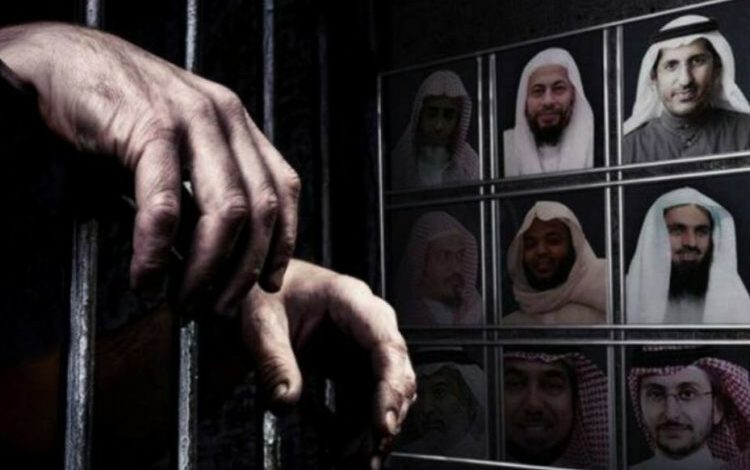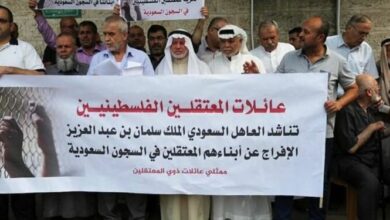Rights groups reveal shocking details of a dissident’s death in prison

Human rights groups revealed shocking details in the file of the death of the opposition academic, Musa Al-Qarni, a few days ago in the prisons of the Saudi regime after 15 years of his arbitrary arrest.
The Saudi Prisoners of Conscience site said that Al-Qarni died last Saturday, October 9, but the Saudi authorities did not disclose this until Tuesday.
The site stated that the Saudi authorities refrained from handing over Al-Qarni’s body to his family until he reached the Prophet’s Mosque to pray for him. He was buried in Al-Baqi’, without his family and loved ones seeing him.
The site also pointed out that the Saudi authorities had prevented Al-Qarni’s family from visiting him, communicating with him, and checking on his health a full month before his death.
The death of Al-Qarni is new evidence of the series of violations that prisoners of conscience are subjected to in Saudi prisons, including the prolonged interrogation and the delay in referring cases beyond the maximum legal deadline.
These violations also include preventing prisoners from meeting their lawyers, not informing them of the latest developments in their cases and only one general practitioner inside the prison in light of the limited available medical equipment.
This comes as international human rights organizations, commenting on Al-Qarni’s death, demanded to stop the slow killing of prisoners of conscience in Saudi Arabia in light of the violations of arbitrary detention, torture and ill-treatment they are subjected to as medical negligence.
Al-Qarni’s death came after a long-suffering from illness and deliberate medical neglect inside the regime’s prisons, as his health condition had deteriorated dramatically in recent years without receiving any medical care.
Al-Qarni spent 15 years in the prisons of the Saudi regime, where he was serving an unfair sentence of 20 years in prison, followed by a 20-year travel ban, after being accused of several charges, including “planning to establish a party”, “communicating with foreign bodies” and “disrupting the ruler” “.
The case dates back to meetings Al-Qarni held with eight Saudi opponents in February 2007 to discuss a project to establish a human rights association concerned with spreading human rights awareness for the Saudi citizen, which they called the Peaceful Public National Assembly.
The Saudi security forces raided the third meeting of these figures and arrested all of them, and brought them to court on charges of forming a “secret organization whose aim is to spread chaos and gain power with the help of outside parties.”
The investigations in the case continued for an extended three and a half years without rulings. The detainees were held in solitary confinement and then were sentenced in August 2010 to severe prison sentences ranging from 10 to 30 years.
Sanad Organization for Human Rights held the Saudi authorities responsible for Al-Qarni’s death in prisons and the slow killing method practised against him, a crime under all international laws.
The organization said that the Saudi authorities violate the “Standard Minimum Rules for the Treatment of Prisoners”, an international system, even though the Kingdom joined it years ago.
In the international system, some conditions and clauses require states that accede to it to abide by how to deal with detainees according to what requires humane observance.
In the government’s policy of dealing with prisoners of conscience in the Kingdom, the Saudi authorities violate most of the provisions of the relevant international system to confirm the extent of the violations that prisoners of conscience are subjected to in government detention.
Sanad Organization stressed that the Saudi authorities must stop their arbitrary policy in dealing with prisoners of conscience and reform the horrific violations that women detainees are witnessing.
For its part, ALQST Foundation for Human Rights called for an international investigation into the death of Al-Qarni, highlighting the widespread torture of prisoners of conscience inside Saudi prisons.
The International Federation expressed its deep concern about the poor conditions of prisoners of conscience in Saudi Arabia, which has a lousy record in treating detainees opposed to the regime, including suspicions of torture and medical negligence.
It also stressed the need for effective international intervention to stop Saudi Arabia’s policies based on silencing dissidents by interrogating, detaining and arbitrarily imprisoning human rights defenders under the Anti-Terrorism Law and the Anti-Cybercrime Law against the background of their peaceful activities and human rights work.





